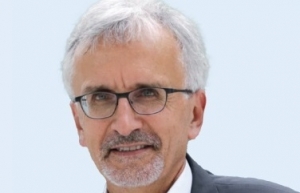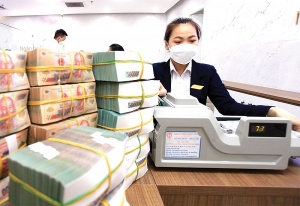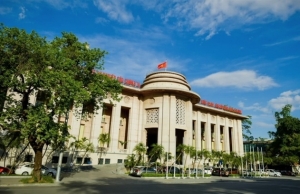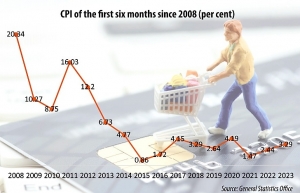Exchange rate pressure to soothe by end of 2023: expert
 |
| Pyon Young Hwan |
US inflation inched up 3.2 per cent on-year in July, higher than the targeted 2 per cent. Does this make it impossible for the Fed to lower interest rates in the near future?
The US inflation hike slowing down in July contributed to reducing the tension, yet the recovery of energy and cereal prices has been curbing the decrease in the consumer price index (CPI), amid the continued increase in housing costs.
Amid the recent decline of the employment and inflation index, the necessity to further push up the interest rate has abated.
It is likely that the Fed will fulfill its increase rate hike cycle at 5.5 per cent, yet the prospects for the Fed to cut the rate seems distant.
What is your take on Vietnam's economy for the rest of the year?
In Vietnam, the interest rate is expected to fall further at a moderate rate in the second half of this year.
The CPI expanded 3.3 per cent in the first half of this year, well below the government’s governance target of 4.5 per cent. In the face of stable prices in the domestic market and the Vietnamese government’s accelerated application of economic stimulus policies, the central bank’s monetary loosening stance might prevail in H2.
Softening interest rates are hoped to stay in H2 amid imminent economic depression both at home and abroad, especially, regarding Fed’s possibility of ending the rate hike cycle.
What are the challenges ahead for Vietnam’s economy?
The corporate bond market needs to be standardised while going through a drastic process of self-purification.
The real dilemma lies in the real estate market, where transparency has not been valued. From my own experience, were the authorities to address the mentioned issues successfully, the country could make substantial strides in driving economic development.
Finally, the Vietnam government should look to become a mediator to facilitate cooperation between domestic companies and global financiers to propel exports.
Do Vietnam’s monetary policies have room for further loosening?
In July, the index of industrial production inched up 3.7 per cent on-year and rose 3.9 per cent over the previous month, continuing the recovery. The export value approximated $29.7 billion, down 3.5 per cent, also the lowest drop since March, and import values hit $27.5 billion, down 9.9 per cent on-year.
In the first seven months of this year, Vietnam’s trade balance saw a surplus of $15.2 billion.
This means, the main economic indicators saw on-year improvements, leveraging the recovery of export and manufacturing. Vietnam's largest export market, is expected to be a positive factor for the rejuvenation of export and production in the near future.
While the State Bank is expected to continue policy easing, the increase in the number of international visitors and the steady recovery of domestic demand are also positives. However, upward price pressure may return in H2 due to recent increases in oil and grain prices, which could become a burden for economic stimulus and recovery.
How will be the exchange rate trend in the rest of 2023?
In the short term, the exchange rate might threaten the VND24,000 per dollar mark. The devaluation of the Vietnamese dong is gradually being narrowed compared to the currencies of other Asian countries, although before this it was one of the least depreciated currencies in the region.
However, with the interest rate gap between the US and Vietnam continuing to grow, plus the recent rebound of imports after significant declines, there is upward pressure on the exchange rate. Towards the end of the year, amid a rebound in global manufacturing, the exchange rate is expected to fall again, averaging around VND23,500 per dollar in Q4.
 | New exchange rate policy not without risk Exchange rate volatility is increasing due to geopolitical shocks across the globe. Thanks to its sound policy framework, Vietnam has remained largely immune to such international turbulence. However, exchange-rate depreciation is not without risks, writes Patrick Lenain, senior associate at the Council on Economic Policies. |
 | Exchange rate spike not deemed an imminent threat The USD exchange rate on the morning of February 24 on the free market and banks both increased sharply compared to the previous session, exceeding the threshold of VND24,000. |
 | Policy interest rate expected to further reduce in H2 2023 The analysts also expect the average 12-month deposit interest rate will drop to 7 per cent per year in 2023. |
 | Stability for rest of 2023 bodes well for inflation rate A low consumer price index in the first six months of the year is expected to contribute to controlled inflation amid a continued downtrend in oil prices and slow-paced consumption. |
What the stars mean:
★ Poor ★ ★ Promising ★★★ Good ★★★★ Very good ★★★★★ Exceptional
Related Contents
Latest News
More News
- 0.1 per cent tax proposed on each transfer of digital assets (February 05, 2026 | 17:27)
- Ministry of Finance tightens policy delivery at start of year (February 05, 2026 | 17:26)
- Vietnam steps up market reforms as FTSE Russell reviews upgrade progress (February 05, 2026 | 17:20)
- 2025 profits mixed amid strong energy and farming results (February 05, 2026 | 17:18)
- Cashless payments hit 28 times GDP in 2025 (February 04, 2026 | 18:09)
- SSIAM and DBJ launch Japan Vietnam Capital Fund (February 04, 2026 | 15:57)
- Banks target stronger profits, credit growth in 2026 (February 04, 2026 | 15:43)
- Vietnam on path to investment-grade rating (February 03, 2026 | 13:07)
- Consumer finance sector posts sharp profit growth (February 03, 2026 | 13:05)
- Insurance market building the next chapter of protection (February 02, 2026 | 11:16)

 Tag:
Tag:


























 Mobile Version
Mobile Version